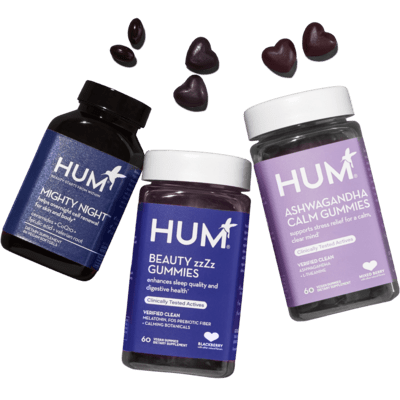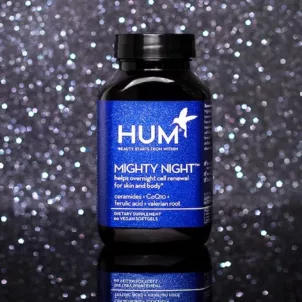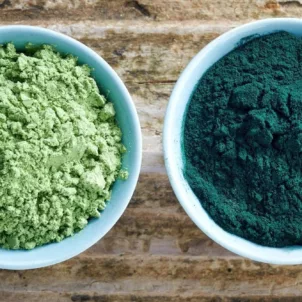THE WELLNEST • Supplements
The Best Vitamins for Skin, According to Experts
By Jessica Nelson, RDN, CPT •
February 29, 2016
Caring for your skin can seem like a complex process. The truth is that the healthier your skin is to begin with, the more radiant it will appear. We consulted with experts on the best vitamins for skin to help you achieve a more radiant, youthful, and clear complexion.

 Dr. Shilpi Agarwal is a board-certified family medicine and integrative and holistic medicine physician. She describes how vitamins play a role in a variety of skin concerns. When it comes to breakouts for instance, Dr. Agarwal notes that “vitamins can help regulate oil production and help balance the skin, which can help prevent and control acne and breakouts.”
Meanwhile, inflammation of the skin can lead to redness, irritation, or exacerbate breakouts. “Inflammation is largely caused by free radicals and irritants in the skin. Vitamins and nutrients can act as powerful antioxidants to help fight this and reduce inflammation. That will lead to more even skin tone and smoother skin,” says Dr. Agarwal.
At the same time, dry or cracked skin requires nourishment and hydration. Dr. Agarwal says that “adequate vitamins and nutrients can help to keep the body hydrated and reduce dryness and cracking. Additionally, vitamins like C help the repair process so these cracks are healed more quickly.”
Dr. Shilpi Agarwal is a board-certified family medicine and integrative and holistic medicine physician. She describes how vitamins play a role in a variety of skin concerns. When it comes to breakouts for instance, Dr. Agarwal notes that “vitamins can help regulate oil production and help balance the skin, which can help prevent and control acne and breakouts.”
Meanwhile, inflammation of the skin can lead to redness, irritation, or exacerbate breakouts. “Inflammation is largely caused by free radicals and irritants in the skin. Vitamins and nutrients can act as powerful antioxidants to help fight this and reduce inflammation. That will lead to more even skin tone and smoother skin,” says Dr. Agarwal.
At the same time, dry or cracked skin requires nourishment and hydration. Dr. Agarwal says that “adequate vitamins and nutrients can help to keep the body hydrated and reduce dryness and cracking. Additionally, vitamins like C help the repair process so these cracks are healed more quickly.”
 Omega-3 fatty acids are responsible for the health of the cell membrane, which influences the cell’s ability to hold water for moist, soft, wrinkle-free skin. Jess Nelson, registered dietitian and certified personal trainer, recommends foods rich in omega-3 fatty acids to help replenish and revitalize skin. “The best vitamins for skin can be found in foods like wild Alaskan salmon, walnuts, flaxseed, and olive oil. Also look for foods that offer anti-inflammatory properties like grapeseed oil, turmeric, and ginger.” When your diet lacks these healthy monounsaturated fats, supplementation with a high-quality omega-3 fish oil can be beneficial for skin and overall health.
Omega-3 fatty acids are responsible for the health of the cell membrane, which influences the cell’s ability to hold water for moist, soft, wrinkle-free skin. Jess Nelson, registered dietitian and certified personal trainer, recommends foods rich in omega-3 fatty acids to help replenish and revitalize skin. “The best vitamins for skin can be found in foods like wild Alaskan salmon, walnuts, flaxseed, and olive oil. Also look for foods that offer anti-inflammatory properties like grapeseed oil, turmeric, and ginger.” When your diet lacks these healthy monounsaturated fats, supplementation with a high-quality omega-3 fish oil can be beneficial for skin and overall health.
 Vitamin B1 (thiamine) is found in many foods such as grains, beans, nuts, and meat. Vitamin B6 (pyridoxine) can be found in legumes, eggs, fish, and veggies such as carrots, spinach, and peas. As some of the best vitamins for skin, B1 and B6 make up a larger group of B vitamins called B-complex. B-complex vitamins help the body metabolize fats and protein, and are essential vitamins for healthy skin, hair, and nails.
According to Dr. Agarwal, “B1 and B6 are important in maintaining healthy skin. Drinking alcohol and living a stressful lifestyle can compromise your skin’s health. We may also become deficient if we’re exercising frequently. These are important for maintaining balance within the skin. Adequate B6 helps reduce excess sebum or oil production on the skin.”
Vitamin B1 (thiamine) is found in many foods such as grains, beans, nuts, and meat. Vitamin B6 (pyridoxine) can be found in legumes, eggs, fish, and veggies such as carrots, spinach, and peas. As some of the best vitamins for skin, B1 and B6 make up a larger group of B vitamins called B-complex. B-complex vitamins help the body metabolize fats and protein, and are essential vitamins for healthy skin, hair, and nails.
According to Dr. Agarwal, “B1 and B6 are important in maintaining healthy skin. Drinking alcohol and living a stressful lifestyle can compromise your skin’s health. We may also become deficient if we’re exercising frequently. These are important for maintaining balance within the skin. Adequate B6 helps reduce excess sebum or oil production on the skin.”
 The best vitamins for skin act as antioxidants in the body to give your skin extra protection and strength. Vitamin A is key to cell growth as it regulates the growth and division of cells. Next, Vitamin C is essential in producing collagen and protects you from the damage done by free radicals. Lastly, Vitamin E protects your cell membranes from damage and regulates your body’s vitamin A levels.
Nutrients that work in the body as antioxidants are some of the best vitamins for skin. Dr. Agarwal describes why: “When the body breaks down pollutants, chemicals, and certain foods, it creates free radicals. Antioxidants help break down these free radicals and reduce stress and damage to the skin. Antioxidants can be found in specific vitamins and help to repair and rebuild skin.
The best vitamins for skin act as antioxidants in the body to give your skin extra protection and strength. Vitamin A is key to cell growth as it regulates the growth and division of cells. Next, Vitamin C is essential in producing collagen and protects you from the damage done by free radicals. Lastly, Vitamin E protects your cell membranes from damage and regulates your body’s vitamin A levels.
Nutrients that work in the body as antioxidants are some of the best vitamins for skin. Dr. Agarwal describes why: “When the body breaks down pollutants, chemicals, and certain foods, it creates free radicals. Antioxidants help break down these free radicals and reduce stress and damage to the skin. Antioxidants can be found in specific vitamins and help to repair and rebuild skin.
 The research on the role of probiotics in skincare is growing at an exciting pace. Early research has shown that certain strains have been prominent in reducing inflammation and eczema, while others were able to decrease oil production and help reduce breakouts. There’s a clear connection between the gut and skin clarity and health.
The research on the role of probiotics in skincare is growing at an exciting pace. Early research has shown that certain strains have been prominent in reducing inflammation and eczema, while others were able to decrease oil production and help reduce breakouts. There’s a clear connection between the gut and skin clarity and health.
 For skin protection and anti-aging supplementation, polypodium leucotomos is a Latin-American fern that we named one of the best supplements for skin in 2016 (and for good reason). Prevention Magazine included it as one of their top anti-aging supplements that work thanks to recent research. It found that the plant helped “preserve human skin’s fibroblasts,” supporting collagen production to prevent wrinkles and sagging skin. If that’s not enough skin-supporting power, the fern also increases the dose of UV radiation it takes to cause sunburn, preventing sun damage in the process.
For skin protection and anti-aging supplementation, polypodium leucotomos is a Latin-American fern that we named one of the best supplements for skin in 2016 (and for good reason). Prevention Magazine included it as one of their top anti-aging supplements that work thanks to recent research. It found that the plant helped “preserve human skin’s fibroblasts,” supporting collagen production to prevent wrinkles and sagging skin. If that’s not enough skin-supporting power, the fern also increases the dose of UV radiation it takes to cause sunburn, preventing sun damage in the process.
SkinCare from Within, by the Experts
Nourishing your body helps care for your skin even before your daily cleansing, toning, and moisturizing routine. That’s why we rounded up the nutrients that are vital to the health and appearance of your complexion. Meet our experts:
 Dr. Shilpi Agarwal is a board-certified family medicine and integrative and holistic medicine physician. She describes how vitamins play a role in a variety of skin concerns. When it comes to breakouts for instance, Dr. Agarwal notes that “vitamins can help regulate oil production and help balance the skin, which can help prevent and control acne and breakouts.”
Meanwhile, inflammation of the skin can lead to redness, irritation, or exacerbate breakouts. “Inflammation is largely caused by free radicals and irritants in the skin. Vitamins and nutrients can act as powerful antioxidants to help fight this and reduce inflammation. That will lead to more even skin tone and smoother skin,” says Dr. Agarwal.
At the same time, dry or cracked skin requires nourishment and hydration. Dr. Agarwal says that “adequate vitamins and nutrients can help to keep the body hydrated and reduce dryness and cracking. Additionally, vitamins like C help the repair process so these cracks are healed more quickly.”
Dr. Shilpi Agarwal is a board-certified family medicine and integrative and holistic medicine physician. She describes how vitamins play a role in a variety of skin concerns. When it comes to breakouts for instance, Dr. Agarwal notes that “vitamins can help regulate oil production and help balance the skin, which can help prevent and control acne and breakouts.”
Meanwhile, inflammation of the skin can lead to redness, irritation, or exacerbate breakouts. “Inflammation is largely caused by free radicals and irritants in the skin. Vitamins and nutrients can act as powerful antioxidants to help fight this and reduce inflammation. That will lead to more even skin tone and smoother skin,” says Dr. Agarwal.
At the same time, dry or cracked skin requires nourishment and hydration. Dr. Agarwal says that “adequate vitamins and nutrients can help to keep the body hydrated and reduce dryness and cracking. Additionally, vitamins like C help the repair process so these cracks are healed more quickly.”
BEST VITAMINS FOR SKIN
Nourishing your body with nutrient-dense foods can help combat your unique skin concerns and support an even, fresh skin tone. According to Dr. Agarwal, “Vitamins and nutrients are often used as cofactors required in cellular processes that repair damaged skin and help grow healthy new skin. Additionally, nutrients help protect the integrity of our skin both inside and out. When we’re depleted of vitamins like A, C, E, and omega 3s, we lack radiance, elasticity, and shine that’s seen in healthy and hydrated skin cells.”For Hydrating Skin: Omega-3 Fatty Acids
 Omega-3 fatty acids are responsible for the health of the cell membrane, which influences the cell’s ability to hold water for moist, soft, wrinkle-free skin. Jess Nelson, registered dietitian and certified personal trainer, recommends foods rich in omega-3 fatty acids to help replenish and revitalize skin. “The best vitamins for skin can be found in foods like wild Alaskan salmon, walnuts, flaxseed, and olive oil. Also look for foods that offer anti-inflammatory properties like grapeseed oil, turmeric, and ginger.” When your diet lacks these healthy monounsaturated fats, supplementation with a high-quality omega-3 fish oil can be beneficial for skin and overall health.
Omega-3 fatty acids are responsible for the health of the cell membrane, which influences the cell’s ability to hold water for moist, soft, wrinkle-free skin. Jess Nelson, registered dietitian and certified personal trainer, recommends foods rich in omega-3 fatty acids to help replenish and revitalize skin. “The best vitamins for skin can be found in foods like wild Alaskan salmon, walnuts, flaxseed, and olive oil. Also look for foods that offer anti-inflammatory properties like grapeseed oil, turmeric, and ginger.” When your diet lacks these healthy monounsaturated fats, supplementation with a high-quality omega-3 fish oil can be beneficial for skin and overall health.
For Skin Strengthening: Vitamins B1 AND B6
 Vitamin B1 (thiamine) is found in many foods such as grains, beans, nuts, and meat. Vitamin B6 (pyridoxine) can be found in legumes, eggs, fish, and veggies such as carrots, spinach, and peas. As some of the best vitamins for skin, B1 and B6 make up a larger group of B vitamins called B-complex. B-complex vitamins help the body metabolize fats and protein, and are essential vitamins for healthy skin, hair, and nails.
According to Dr. Agarwal, “B1 and B6 are important in maintaining healthy skin. Drinking alcohol and living a stressful lifestyle can compromise your skin’s health. We may also become deficient if we’re exercising frequently. These are important for maintaining balance within the skin. Adequate B6 helps reduce excess sebum or oil production on the skin.”
Vitamin B1 (thiamine) is found in many foods such as grains, beans, nuts, and meat. Vitamin B6 (pyridoxine) can be found in legumes, eggs, fish, and veggies such as carrots, spinach, and peas. As some of the best vitamins for skin, B1 and B6 make up a larger group of B vitamins called B-complex. B-complex vitamins help the body metabolize fats and protein, and are essential vitamins for healthy skin, hair, and nails.
According to Dr. Agarwal, “B1 and B6 are important in maintaining healthy skin. Drinking alcohol and living a stressful lifestyle can compromise your skin’s health. We may also become deficient if we’re exercising frequently. These are important for maintaining balance within the skin. Adequate B6 helps reduce excess sebum or oil production on the skin.”
For Antioxidants: Vitamins A, C, AND E
 The best vitamins for skin act as antioxidants in the body to give your skin extra protection and strength. Vitamin A is key to cell growth as it regulates the growth and division of cells. Next, Vitamin C is essential in producing collagen and protects you from the damage done by free radicals. Lastly, Vitamin E protects your cell membranes from damage and regulates your body’s vitamin A levels.
Nutrients that work in the body as antioxidants are some of the best vitamins for skin. Dr. Agarwal describes why: “When the body breaks down pollutants, chemicals, and certain foods, it creates free radicals. Antioxidants help break down these free radicals and reduce stress and damage to the skin. Antioxidants can be found in specific vitamins and help to repair and rebuild skin.
The best vitamins for skin act as antioxidants in the body to give your skin extra protection and strength. Vitamin A is key to cell growth as it regulates the growth and division of cells. Next, Vitamin C is essential in producing collagen and protects you from the damage done by free radicals. Lastly, Vitamin E protects your cell membranes from damage and regulates your body’s vitamin A levels.
Nutrients that work in the body as antioxidants are some of the best vitamins for skin. Dr. Agarwal describes why: “When the body breaks down pollutants, chemicals, and certain foods, it creates free radicals. Antioxidants help break down these free radicals and reduce stress and damage to the skin. Antioxidants can be found in specific vitamins and help to repair and rebuild skin.
For Skin Clearing: Probiotics
 The research on the role of probiotics in skincare is growing at an exciting pace. Early research has shown that certain strains have been prominent in reducing inflammation and eczema, while others were able to decrease oil production and help reduce breakouts. There’s a clear connection between the gut and skin clarity and health.
The research on the role of probiotics in skincare is growing at an exciting pace. Early research has shown that certain strains have been prominent in reducing inflammation and eczema, while others were able to decrease oil production and help reduce breakouts. There’s a clear connection between the gut and skin clarity and health.
For Protecting Skin: Polypodium Leucotomos
 For skin protection and anti-aging supplementation, polypodium leucotomos is a Latin-American fern that we named one of the best supplements for skin in 2016 (and for good reason). Prevention Magazine included it as one of their top anti-aging supplements that work thanks to recent research. It found that the plant helped “preserve human skin’s fibroblasts,” supporting collagen production to prevent wrinkles and sagging skin. If that’s not enough skin-supporting power, the fern also increases the dose of UV radiation it takes to cause sunburn, preventing sun damage in the process.
For skin protection and anti-aging supplementation, polypodium leucotomos is a Latin-American fern that we named one of the best supplements for skin in 2016 (and for good reason). Prevention Magazine included it as one of their top anti-aging supplements that work thanks to recent research. It found that the plant helped “preserve human skin’s fibroblasts,” supporting collagen production to prevent wrinkles and sagging skin. If that’s not enough skin-supporting power, the fern also increases the dose of UV radiation it takes to cause sunburn, preventing sun damage in the process.
Skin Supplementation
Nutrient-dense foods are key in maintaining healthy skin and a youthful, glowing complexion. Nelson says, “If you’re already eating a healthy diet, drinking plenty of water, and using a good skin care routine but still having skin issues, it may be that your body requires a supplement. Supplementation can provide you with more of these highlighted nutrients and/or some unique herbal ingredients that aren’t readily available at the supermarket, such as black currant seed oil.” When choosing the best nutrients for your skin concerns, Nelson recommends looking for a supplement that offers a range of essential nutrients. Specifically, vitamins A, C, D, and E improve the look, texture, and feel of your skin.More like this









